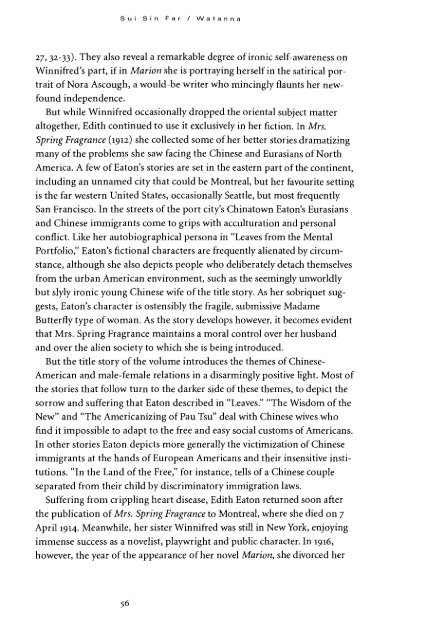To All Appearances A Lady - University of British Columbia
To All Appearances A Lady - University of British Columbia
To All Appearances A Lady - University of British Columbia
You also want an ePaper? Increase the reach of your titles
YUMPU automatically turns print PDFs into web optimized ePapers that Google loves.
S u i S i n F a r / W a t a n n a<br />
2 7> 32-33). They also reveal a remarkable degree <strong>of</strong> ironic self-awareness on<br />
Winnifred's part, if in Marion she is portraying herself in the satirical portrait<br />
<strong>of</strong> Nora Ascough, a would-be writer who mincingly flaunts her newfound<br />
independence.<br />
But while Winnifred occasionally dropped the oriental subject matter<br />
altogether, Edith continued to use it exclusively in her fiction. In Mrs.<br />
Spring Fragrance (1912) she collected some <strong>of</strong> her better stories dramatizing<br />
many <strong>of</strong> the problems she saw facing the Chinese and Eurasians <strong>of</strong> North<br />
America. A few <strong>of</strong> Eaton's stories are set in the eastern part <strong>of</strong> the continent,<br />
including an unnamed city that could be Montreal, but her favourite setting<br />
is the far western United States, occasionally Seattle, but most frequently<br />
San Francisco. In the streets <strong>of</strong> the port city's Chinatown Eaton's Eurasians<br />
and Chinese immigrants come to grips with acculturation and personal<br />
conflict. Like her autobiographical persona in "Leaves from the Mental<br />
Portfolio," Eaton's fictional characters are frequently alienated by circumstance,<br />
although she also depicts people who deliberately detach themselves<br />
from the urban American environment, such as the seemingly unworldly<br />
but slyly ironic young Chinese wife <strong>of</strong> the title story. As her sobriquet suggests,<br />
Eaton's character is ostensibly the fragile, submissive Madame<br />
Butterfly type <strong>of</strong> woman. As the story develops however, it becomes evident<br />
that Mrs. Spring Fragrance maintains a moral control over her husband<br />
and over the alien society to which she is being introduced.<br />
But the title story <strong>of</strong> the volume introduces the themes <strong>of</strong> Chinese-<br />
American and male-female relations in a disarmingly positive light. Most <strong>of</strong><br />
the stories that follow turn to the darker side <strong>of</strong> these themes, to depict the<br />
sorrow and suffering that Eaton described in "Leaves." "The Wisdom <strong>of</strong> the<br />
New" and "The Americanizing <strong>of</strong> Pau Tsu" deal with Chinese wives who<br />
find it impossible to adapt to the free and easy social customs <strong>of</strong> Americans.<br />
In other stories Eaton depicts more generally the victimization <strong>of</strong> Chinese<br />
immigrants at the hands <strong>of</strong> European Americans and their insensitive institutions.<br />
"In the Land <strong>of</strong> the Free," for instance, tells <strong>of</strong> a Chinese couple<br />
separated from their child by discriminatory immigration laws.<br />
Suffering from crippling heart disease, Edith Eaton returned soon after<br />
the publication <strong>of</strong> Mrs. Spring Fragrance to Montreal, where she died on 7<br />
April 1914. Meanwhile, her sister Winnifred was still in New York, enjoying<br />
immense success as a novelist, playwright and public character. In 1916,<br />
however, the year <strong>of</strong> the appearance <strong>of</strong> her novel Marion, she divorced her

















